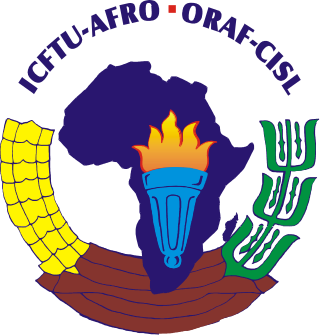Related Research Articles

The International Confederation of Free Trade Unions (ICFTU) was an international trade union. It came into being on 7 December 1949 following a split within the World Federation of Trade Unions (WFTU), and was dissolved on 31 October 2006 when it merged with the World Confederation of Labour (WCL) to form the International Trade Union Confederation (ITUC).

The World Confederation of Labour (WCL) was an international labour organization founded in 1920 and based in Europe. Fascist governments of the 1930s repressed the federation and imprisoned many of its leaders, limiting operations until the end of World War II. In 2006 it became part of the International Trade Union Confederation (ITUC), ending its existence as an independent organization.
Education International (EI) is a global union federation (GUF) of teachers' trade unions consisting of 383 member organizations in 178 countries and territories that represents over 32 million education teachers and education support personnel from pre-school through university. It is one of the world's largest sectoral global union federations.

The International Textile, Garment and Leather Workers' Federation (ITGLWF) was a global union federation. In 2005 it had 217 member organizations in 110 countries, representing a combined membership of over 10 million workers.
Community is a British trade union which formed in 2004. The union represents workers in a diverse range of sectors, including iron and steel, justice and custodial, domestic appliance manufacturing, textiles and footwear, road transport, betting, the third sector, education and early years as well as the self-employed.
The Organisation of African Trade Union Unity (OATUU) is an independent regional union federation aimed at unifying trade union centres in Africa. This organisation was founded in April, 1973 as a successor to two previously competing labour union organisations in Africa: the All-African Trade Union Federation (AATUF) and the African Trade Union Confederation (ATUC). The process to unify a Pan-African labour union organisation also involved international labour organisations as decision-making stakeholders like the International Confederation of Free Trade Unions (ICFTU) and the World Federation of Trade Unions (WFTU). Finally, also with the help of the Organisation of African Unity (OAU), the AATUF and the ATUC merged to form the OATUU. The driving factors for this unification and the creation of the OATUU was to advance Pan-Africanism, economic justice, and social justice throughout African workplaces.

The International Trade Union Confederation (ITUC) is the world's largest trade union federation.

The ICFTU African Regional Organisation (AFRO) was a regional organisation of the International Confederation of Free Trade Unions (ICFTU), representing trade unions from countries in Africa.

The ICFTU Asia and Pacific Regional Organisation (APRO) was a regional organisation of the International Confederation of Free Trade Unions (ICFTU), representing trade unions from countries in Asia and Oceania.

The International Federation of Trade Unions was an international organization of trade unions, existing between 1919 and 1945. IFTU had its roots in the pre-war IFTU.

The Ghana Trades Union Congress is a national centre that unites various workers' organizations in Ghana. The organization was established in 1945.

The Trades Union Congress (TUC) is a national trade union centre, a federation of trade unions that collectively represent most unionised workers in England and Wales. There are 48 affiliated unions with a total of about 5.5 million members. Paul Nowak is the TUC's current General Secretary, serving from January 2023.
The Plantation Workers International Federation was an international trade secretariat of the International Confederation of Free Trade Unions. PWIF was founded at the firth ICFTU world congress held in Tunis in July 1957. Samuel Powell Claret was appointed as the general secretary of PWIF and Tom Bavin as its Director of Organisation. PWIF was launched by ICFTU to organize plantation unions in the Third World.
Walter Schevenels was a Belgian trade union official.

Bruno Storti was an Italian trade unionist and politician.
The International Federation of Petroleum and Chemical Workers (IFPCW) was a global union federation bringing together trade union representing workers in the chemical and oil industries.
The International Secretariat of Entertainment Trade Unions (ISETU) was a global union federation bringing together trade unions representing workers in the arts, media and entertainment industries.
The International Federation of Variety Artists (IFVA) was a global union federation bringing together trade unions representing entertainers other than musicians and actors.
John Kofi Barku Tettegah (1930–2009) was a Ghanaian trade unionist, diplomat, and politician. He held many influential positions in Ghana's government especially during the Nkrumah government, where he served as general-secretary of the Gold Coast Trades Union Congress (TUC), as a Convention People's Party (CPP) central committee member, and secretary-general of the All-African Trade Union Federation. He was influential to Kwame Nkrumah's domestic and foreign policy, and remains one of the most influential political organizers in Ghanaian labor history.
References
- 1 2 3 4 5 6 7 Carew, Anthony (2000). The International Confederation of Free Trade Unions. Oxford: Peter Lang. p. 579. ISBN 9783906764832.
- 1 2 Campbell, Joan; Windmuller, John (1992). European Labor Unions. Greenwood Publishing. pp. 535–536. ISBN 031326371X.
- ↑ "European Regional Organisation of the ICFTU". Annual Report of the Trades Union Congress: 272–273. 1968.